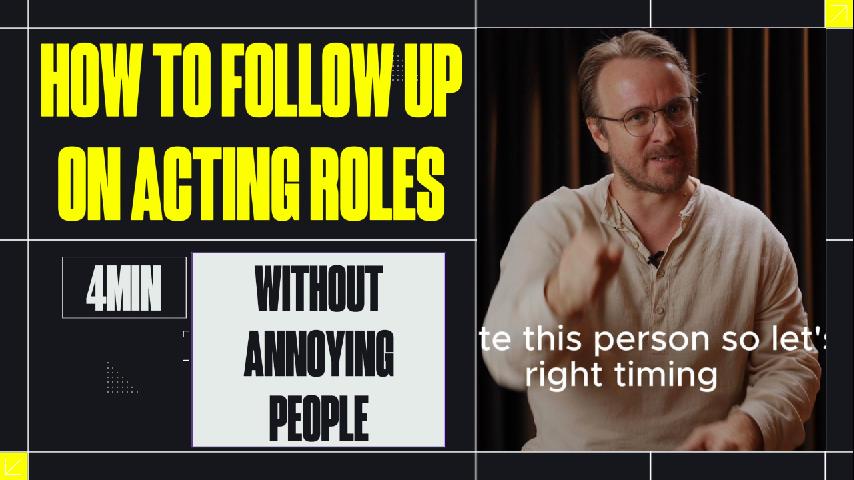Focus: how to follow up on acting roles, audition follow-up, casting director follow-up, actor follow-up message
You did the audition. You sent the self-tape.
And now you’re refreshing your email like it’s a full-time job.
Every actor faces the same question:
“Should I follow up… or will I annoy the casting director and ruin my chances forever?”
This guide is for you — whether you’re in Bangkok filming your next reel, or in your bedroom rehearsing your next monologue.
Following up the right way can strengthen relationships, build trust, and make casting remember your professionalism.
But doing it wrong… well… don’t do it wrong. 😅
Watch the full video here:
Why Following Up Matters (More Than You Think)
Most actors avoid follow-ups because they’re scared of seeming desperate.
But here’s the truth:
A respectful follow-up shows professionalism, confidence, and genuine interest.
Casting directors aren’t annoyed by a well-timed message — they’re annoyed by ten badly timed ones.
When done correctly, a follow-up can help you:
- Stay top of mind
- Build long-term relationships
- Show you take your craft seriously
- Demonstrate respect for their time
In other words:
A good follow-up opens doors.
A bad one gets doors closed.
When Is the Right Time to Follow Up?
Timing is everything.
Most casting directors operate with tight schedules, shifting deadlines, and client revisions — projects move fast and decisions can change overnight.
A good rule of thumb:
Follow up 5–7 days after your audition or self-tape submission.
Not sooner.
Not “three hours later because you’re anxious.” 😅
If they gave you a specific timeline (for example, “we’ll decide by Friday”), wait one extra day after that date.
Show patience and professionalism.
What Your Follow-Up Message Should Say
Short. Clear. Respectful.
No emotional paragraphs. No “Did I get it???”
No existential crisis in email form.
Here’s a simple structure you can use:
Subject: Thank you for the opportunity – [Your Name]
Message:
Hi [Name],
Thank you again for the opportunity to audition for [Role/Project].
If there’s any additional material or information you need from me, I’m happy to provide it.
Wishing you a great week ahead.
Best regards,
[Your Name]
That’s it.
Professional. Polite. Low-pressure.
This tone keeps the door open without pushing it open.
The Mistakes That Annoy Casting Directors
A few things to avoid at all costs:
- Following up too soon
- Sending long emotional messages
- Asking for feedback (huge red flag)
- Reaching out repeatedly
- Messaging casting on their private social media
- Acting entitled to a reply
Remember:
Your professionalism is remembered long after the audition.
The Secret: It’s Not Just About the Role
This is the twist most actors miss:
Following up isn’t about booking this job.
It’s about building a relationship that gets you considered for the next ten jobs.
Casting directors cast hundreds of roles.
And they remember the actors who are:
- Respectful
- Easy to work with
- Patient
- Professional
You’re not just auditioning for a role —
you’re auditioning for the room.
About Robin Schroeter
Acting Coach | Director | Actor
Founder of MasterClass Studio, Bangkok.
Appearances include Bangkok Breaking, The Creator, The Last Full Measure, and Avenue Q.
Robin trains actors locally and internationally to build real careers — not just moments.
Ready to Level Up Your Acting Career?
If you want to be the actor casting remembers, start training with us:
- 🎭 Start here: Fundamentals of Acting Course
- 🎬 Camera-focused: Acting for Film Course
- 💬 Plan your path: Free 30-Minute Online Consultation
- 📖 Step-by-step guide: 15-Step Guide to Becoming an Actor in Thailand (ebook)
Final Thought
When you follow up with confidence instead of fear, you show casting that you’re not just another hopeful actor —
you’re a professional artist.
Patience, clarity, and respect will take you further than anxiety ever will.
Now tell me:
What’s the most awkward follow-up you’ve ever sent? (Be brave… we’ve all been there 😅)


Recent Comments